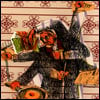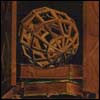Rabbi Yosi opened the discussion saying, "But none says, Where is G‑d our Maker, Who gives songs in the night". (Job 35:10) Come and see: When the north wind stirs at midnight, we explained that a flame comes out and strikes under the wings of the [supernal] rooster [Gabriel], and he flaps his wings [his angelic troops, and he causes them to sing praise to their Master, whereby the earthly roosters awaken, and likewise flap their wings] and crow. When that flame touches him and stirs opposite him, he looks at it, trembles and cries out, looking and searching for his Master's glory to do His bidding and cries out to men to awaken for their divine service.
He is therefore called [in Hebrew] "sechvi", derived from watching [in Hebrew, "soche"] and a cock [in Hebrew] gever, since he is awakened by the flame of gevura and comes from the side of gevura to awaken the world.
Then the faithful stand and give might and strength to the Congregation of Israel [malchut] by being occupied with the Torah, and the praises of the Torah are being sung. For David attained the kingdom for himself and his sons forever and ever, for all generations. [By getting up at midnight and giving might and strength to malchut/kingship, he too merited being king.]
When the cock crows and people sleep in their beds and do not rise, the cock crows later and says that which he says, as we already explained: he then flaps his wings and says, Woe to so-and-so, reproached by his Master and abandoned by his Master, since his spirit did not wake and he did not behold the glory of the King.
When day breaks, a herald cries and says of him: "But none says, Where is G‑d our Maker, Who gives songs in the night" [he who doesn't awaken form the crow's cries is not attaching enough importance to the fact that it is from His loving-kindness that he may] help Him by saying praises, so that all will help as one. "Our Maker" - should have been in the singular [i.e. my Maker]. Why does it say "our Maker"? This applies when man rises at midnight and is occupied with the praises of the Torah, as only Torah studied at night is called "praises", and when he is engrossed in the Torah [at night], when day breaks, the Holy One, blessed be He [tiferet], and the Congregation of Israel [malchut] prepare for him a thread of grace so that he will be saved from everything, to shine for him both among the high and the low beings. [Therefore the verse says "our", to refer to tiferet and malchut together.]
Rabbi Yehuda said, I heard that Rabbi Aba discoursed the verse, "Where is G‑d our Maker." It should have said, 'Who makes for me'. Why say "our maker"? As you said, when man rises at midnight and studies the Torah, at daybreak Abraham awakens by his thread of [kindness] which it is written, "From a thread [of kindness] even to a shoelace..." (Gen. 14:23) The Holy One, blessed be He [tiferet], and the Congregation of Israel [malchut] reshape him [the man that rises and studies torah at night] and make him daily into a new creature. Hence, "our Maker." [Both the man I was yesterday and the man I have become today.]
We have explained that it says: "our G‑d our Maker"; the word [for] our G‑d ["Eloka", is made up of the word] "E-l" and Vav-Hei. E-l [representing chesed] is Abraham, as it is written, 'the great E-l' [meaning the G‑d Who is great in kindness]. Vav is the Holy One, blessed be He [tiferet]. Hei is the Congregation of Israel [malchut]. [Altogether] this is Eloka [chesed, tiferet, and malchut]. They make man and reshape him daily. Hence the verses, "our Makers," [said in plural] as "Let Israel rejoice in his makers". (Psalms 149:2) Rabbi Yosi said, Surely this is so, and everything said here amounts to the same thing.
BeRahamim LeHayyim: What does this mean to you and why is it revealed right now?
Above is praised Torah Study from Midnight until dawn, which guarantees a thread of kindness to all your pursuits on that day. This sounds superhuman, but some, like my teacher Yitzchak Schwartz, learned at the Midnight Yeshiva in Jerusalem for almost 20 years!
The body which is material [in Hebrew, 'Homer'] can be trained like a donkey [in Hebrew, 'Hamor']. We all understand this. Just watching the recent Olympics may have left us with open mouths at the incredible talents of modern athletes.
Learning Oral Torah and secrets of Torah at night virtually guarantee good reception, as the body is relaxed but the spirit is awake.
Bracketed annotations from Metok Midevash and Sulam commentaries
Copyright 2003 by KabbalaOnline.org, a project of Ascent of Safed (//ascentofsafed.com). All rights reserved, including the right to reproduce this work or portions thereof, in any form, unless with permission, in writing, from Kabbala Online.





Start a Discussion